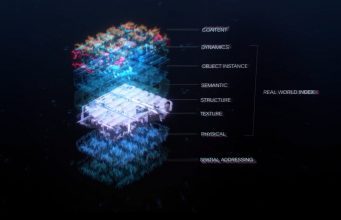
Today at Oculus Connect 6, Facebook formerly announced plans to develop a consumer-focused AR headset. But while the company wasn’t ready to actually talk about the product, they said their focus is starting first on a building a copy of the real world called LiveMaps.
Facebook said outright on stage today, “we’re building an AR headset.” This has been more or less known for some time, but now the company is talking about the steps its taking to actually get there.
In order to deliver the vision of breaking down the barrier between the real and digital worlds, Facebook says they first need a digital copy of the real world—a foundation for an augmented reality headset to understand and interact with reality.
Facebook is calling it LiveMaps, and says it will be a “multi-layer representation of the world,” and one which will crowdsource data from connected devices in real time to provide a constantly updated picture of the real world.
This isn’t just about tracking a device’s location in physical space (though that will surely be an important part of it), it’s about laying a comprehensive foundation for augmented reality devices to understand and digitally modify our world.
Facebook isn’t the first company to be working on this problem, which has also been referred to as the ‘AR cloud’ or ‘mirror world’, among others, and there’s widespread agreement among AR pioneers that such a foundation is essential to the mainstream AR vision that’s been seen in concept videos for more than a decade.
This story is breaking, check back for more info as we get it.
The post Facebook is Building an AR Headset, Starting By Making a Digital Copy of the Real World appeared first on Road to VR.
Ream more: https://www.roadtovr.com/facebook-ar-headset-livemaps/
No comments:
Post a Comment